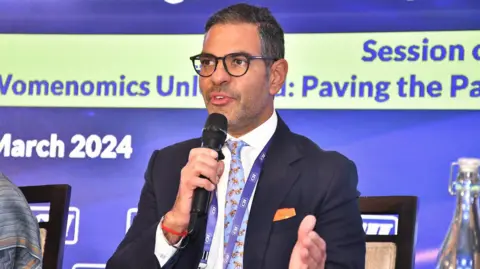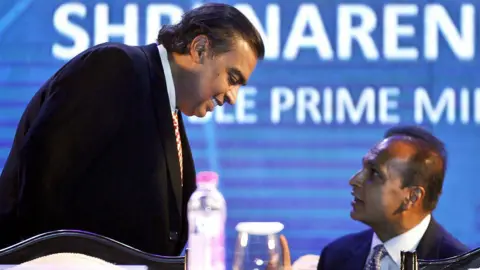ARTICLE AD BOX
Devina Gupta
BBC News, Delhi

 Sunjay Kapur/X
Sunjay Kapur/X
Sunjay Kapur suffered a heart attack in June while playing polo in the UK
An Indian tycoon's sudden death in June has triggered a fierce inheritance battle at an Indian automotive giant.
Sunjay Kapur, 53, suffered a heart attack on 12 June while playing polo in Surrey in the UK. He was an heir to Sona Comstar, a $3.6bn (£2.7bn) business empire he inherited from his father. The company, among India's top auto component makers, has a global footprint with 10 plants spread across India, China, Mexico and the US.
A polo enthusiast, Kapur moved in the elite social circles of Indian capital Delhi, and reportedly shared a friendship with Prince William. He was married three times - first to designer Nandita Mahtani, then to 90s Bollywood star Karisma Kapoor, before marrying Priya Sachdev, a former model and entrepreneur, in 2017.
But weeks after his death, the question of succession has made Kapur and his family the subject of media speculation.
At the centre of it is Kapur's mother Rani Kapur, former chairperson of Sona Comstar.
On 24 July, Rani Kapur sent a letter to the board of Sona Comstar, raising questions about her son's death and appointments made by the company after that.
In the letter, which the BBC has seen, she alleged that Kapur's death was under "highly suspicious and unexplained circumstances".
The coroner's office in Surrey told the BBC that after a postmortem, it had determined that Kapur died of natural causes. "The investigation has been closed," the office said.

 Getty Images
Getty Images
Sunjay Kapur was married to Bollywood actress Karisma Kapoor, but the couple later divorced
Rani Kapur also claims to have been coerced into signing key documents while under mental and emotional distress from her son's death.
"It is unfortunate that while the family and I are still in mourning, some people have chosen this as an opportune time to wrest control and usurp the family legacy," she wrote.
She also asked Sona Comstar's board to postpone its annual general meeting (AGM) - which was set for 25 July - to decide on a new director who would be a representative of the family.
Rani Kapur didn't specify who she meant by "some people", but Sona Comstar held the AGM the next day anyway and appointed Sunjay's wife Priya as a non-executive director.
In her letter, Rani Kapur claimed she was the sole beneficiary of her late husband's estate in a will left behind in 2015 which included a majority stake in Sona Group, including Sona Comstar.
The company has strongly denied Rani Kapur's claims and said that she has had "no role, direct or indirect, in Sona Comstar since at least 2019".
The board also said it had no compulsion to defer to her notice and that the AGM was conducted "in full compliance with the law". The company has issued a legal notice to Rani Kapur, asking her to stop spreading "false, malicious and damaging" statements.
The BBC has contacted Sona Comstar, Rani Kapur and Priya Sachdev with questions.
Public shareholders, including banks, mutual funds and financial institutions, hold 71.98% of Sona Comstar, which is listed on Indian exchanges as Sona BLW.
The remaining 28.02% is held by promoters via a company called Aureus Investments Pvt Ltd.
According to the company's filings, Sunjay Kapur was the sole beneficiary of the RK Family Trust, which controls the promoters' stake in Sona Comstar via Aureus Investments.
"Looking at the company structure, at this point of time, Rani Kapur doesn't feature as a registered shareholder so won't have any voting rights. But there is the matter of the RK Family Trust and Aureus investments. We can't really know if Rani holds any direct interest there till the agreement is made public," says Tushar Kumar, a corporate litigator at India's Supreme Court.
The Kapur family's feud isn't an isolated case.
Some 90% of listed companies in India are family-controlled, yet only 63% have a formal succession plan in place, according to a PwC survey.
Kavil Ramachandran of the Indian School of Business says most Indian family businesses operate with "significant ambiguity about specifics".
"One such [area] is who owns how much and who inherits and when," he adds.
Experts say family involvement without meritocracy and absence of formal agreements complicate matters.
"On the demise of the patriarch (or even before), disputes arise, both on ownership and on management, and too much water would have flowed under the bridge for issues to be resolved amicably," said Ketan Dalal, who advises several Indian business families on ownership structures.

 Getty Images
Getty Images
Asia's richest man Mukesh Ambani (left) was once embroiled in a very public power struggle with his younger brother Anil
India Inc. is strewn with bitter succession battles that repeatedly grab headlines.
Mukesh Ambani, Asia's richest man, was once embroiled in a very public power struggle with his younger brother over the sprawling Reliance empire after their father Dhirubhai Ambani died in 2002 without leaving a will. It was their mother, Kokilaben, who brokered peace years later.
More recently, family feuds have erupted at the Raymond Group, India's most famous textiles company, and among the Lodha brothers, whose company built the Trump tower in Mumbai.
All of this has often come at a great cost to Indian shareholders.
"Anyone who has kept infinite control in their hands has suffered. In the end it's the company that suffers, the stock prices go down and [so does] the perception of how the company will do in the future," says Sandeep Nerlekar, founder and managing director of legacy planning firm Terentia.
But some families are now once bitten, twice shy.
The Bajaj family, one of the country's biggest conglomerates, faced internal wrangling over succession until a court stepped in during the 2000s to resolve the dispute.
The patriarch mapped out a succession plan for the group, dividing responsibilities between his sons and cousin. As per the company's statement, the group now operates through consensus via a family council.
Last year, one of India's oldest business houses, the locks-to-real estate Godrej Group, announced an uncharacteristically amicable separation of their multi-billion dollar business.
"Families need to work on succession planning with governance structures like a good board that has teeth. They should be given some control so that the business can grow long term. Also you need to allow the next generation to take the lead well in time and the patriarch should take the time to groom them so that family issues don't happen," says Mr Nerlekar.
The likes of Mukesh Ambani appear to have taken that seriously, having begun grooming his three children well in advance.
Mr Ramachandran says that succession is not something that can be decided "overnight".
"Preparing both the family and the operating team over a planned transition period is crucial."
Follow BBC News India on Instagram, YouTube, Twitter and Facebook.

 4 hours ago
13
4 hours ago
13








 English (US) ·
English (US) ·